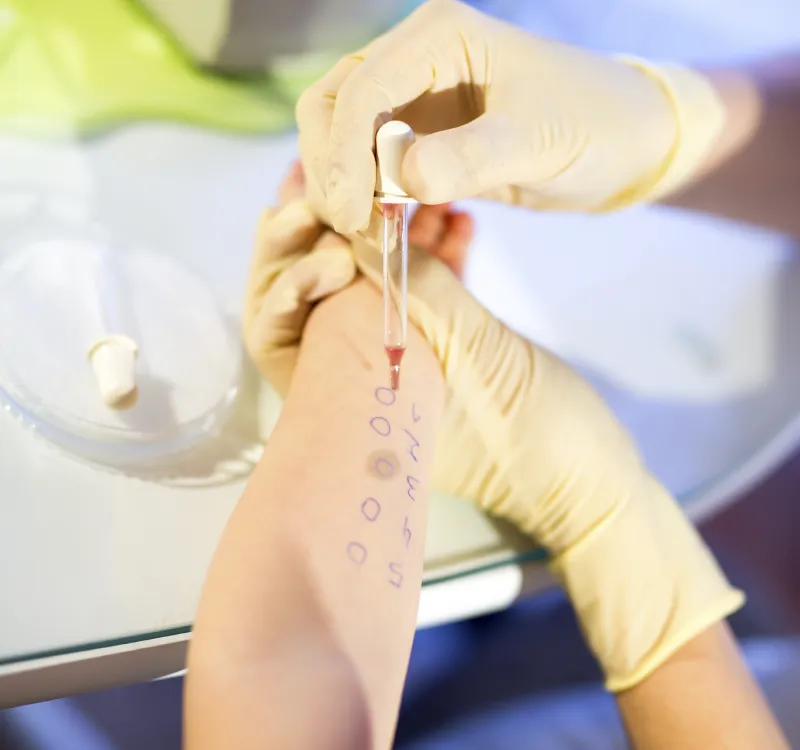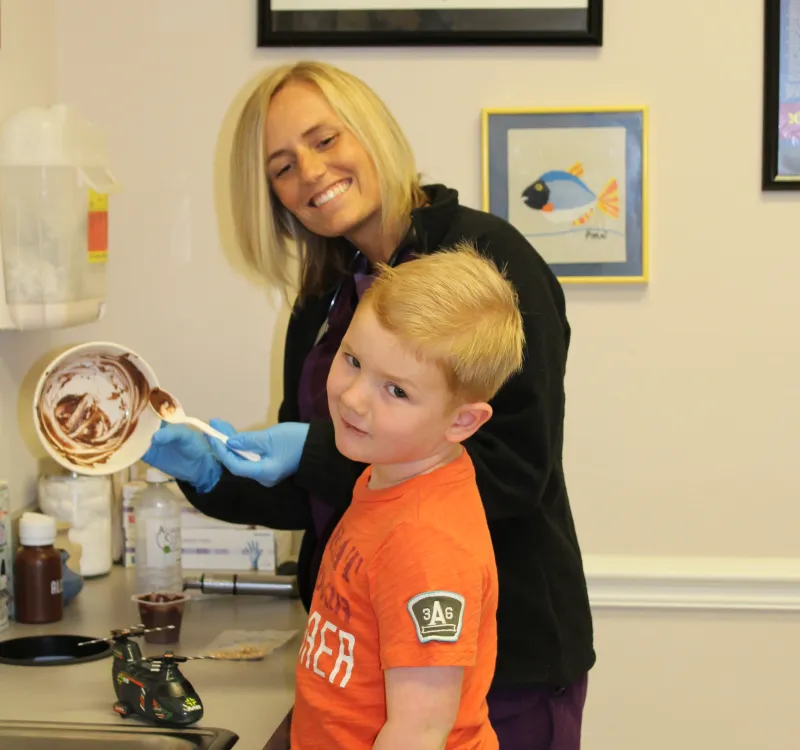
Food Allergies
Life Threatening Reactions, Food Related Skin Problems, Eosinophilic GI Problems
What is a food allergy?
A food allergy occurs when the body overreacts to a food that generally does not cause symptoms in most people. The most common food allergies in children include milk, eggs, soy, wheat, and peanuts. In older children and adults, allergic reactions to tree nuts, fish and shellfish including lobster, crab, shrimp, and clams are common as well.
How do you diagnose food allergy?
For physicians, the most important part of diagnosing a food allergy is hearing the history and circumstances of the reaction. Generally, allergic reactions occur very rapidly with symptoms usually developing within a few minutes to an hour after eating. The physician will also look for the typical signs and symptoms of an allergic reaction such as diarrhea, stomach pain, hives, difficulty swallowing, or difficulty breathing.

Testing
After the physician has taken the reaction history, allergy testing is often performed to confirm the presence of an allergy. There are a few different tests that can be used. The Allergy Clinic of Tulsa offers skin testing, patch testing, and food challenges at our clinics under medical supervision. RAST testing can be performed at a local hospital or lab.
- Skin testing- A small amount of a suspected allergen is placed on or below the skin to see if a reaction develops.
- Patch testing – This form of testing can be if the patient has eczema and the results were negative on the skin test, or if the patient has contact dermatitis. After 48 hours, the patches will be removed. The physician will read the test at both 48 and 96 hours. (Patches are usually placed on a Monday, and read on a Wednesday and Friday)
- RAST testing – This form of testing involves drawing blood and looking for antibodies that the body might make in response to allergens. These blood tests are not as sensitive as skin tests but are often used for people who are not able to have skin testing.
- Food challenge – This test is performed in a medical setting by experienced personnel. Proper medications and equipment are readily available just in case a severe allergic reaction called anaphylaxis occurs. Consequently, patients who have uncontrolled asthma or who are otherwise ill should not participate in a food challenge. Our physicians will check vital signs, lung function, and perform a physical examination before and during a food challenge. During the test, the patient eats increasing amounts of the suspected food. This test can take between four to eight hours, depending on the substance. Parents should be present for the whole challenge if their child is being tested.
Depending on the nature of the suspected food allergy, there are two ways our clinic generally administers this test.
- Open food challenge – In this challenge, both the patient and medical personnel know when the patient is eating the suspected food allergen and the placebo (food the patient is not allergic to).
- Double-blind food challenge – In this challenge, neither the patient nor the medical personnel conducting the test knows when the patient is eating the suspected food allergen and the placebo (food the patient is not allergic to). However, for safety purposes, the physician overseeing the test will know what the patient is eating.

Treatment
The Allergy Clinic of Tulsa is pleased to offer oral immunotherapy for the treatment of some food allergies. This treatment is done under medical supervision who are trained to treat anaphylaxis if it occurs. The goal of oral immunotherapy is to provide a long-term solution for egg, milk, peanut and wheat allergy. At the end of the 5 to 6 month program patients with egg, milk, peanut or wheat allergy will be able to consume these foods with no allergic reactions.
The first visit for oral immunotherapy is a full day process during which the patient will be administered multiple doses of very small amounts of diluted milk, diluted egg powder, diluted peanut powder, or diluted wheat powder. The patient will return weekly for increasing doses followed by one hour of observation. Between each visit the patient will take two doses of the desensitizing food each day at home. Oral immunotherapy is complete when the previously allergy causing food can be freely included in the diet. To maintain tolerance the food must be eaten daily.
This program is designed for a child of school age or older who will be old enough to understand the reasons for participating and be actively involved in the process. Upon completion of this program, the patient should have tolerance to these foods allowing the patient to consume egg milk, peanut or wheat without any adverse reactions.
